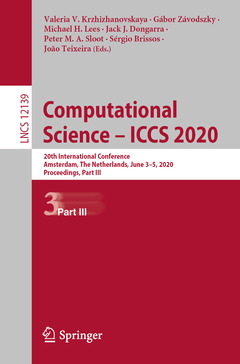Computational Science - ICCS 2020, 1st ed. 2020 20th International Conference, Amsterdam, The Netherlands, June 3-5, 2020, Proceedings, Part III Theoretical Computer Science and General Issues Series
Coordonnateurs : Krzhizhanovskaya Valeria V., Závodszky Gábor, Lees Michael H., Dongarra Jack J., Sloot Peter M. A., Brissos Sérgio, Teixeira João

The seven-volume set LNCS 12137, 12138, 12139, 12140, 12141, 12142, and 12143 constitutes the proceedings of the 20th International Conference on Computational Science, ICCS 2020, held in Amsterdam, The Netherlands, in June 2020.*
The total of 101 papers and 248 workshop papers presented in this book set were carefully reviewed and selected from 719 submissions (230 submissions to the main track and 489 submissions to the workshops). The papers were organized in topical sections named:
Part I: ICCS Main Track
Part II: ICCS Main Track
Part III: Advances in High-Performance Computational Earth Sciences: Applications and Frameworks; Agent-Based Simulations, Adaptive Algorithms and Solvers; Applications of Computational Methods in Artificial Intelligence and Machine Learning; Biomedical and Bioinformatics Challenges for Computer Science
Part IV: Classifier Learning from Difficult Data; Complex Social Systems through the Lens of Computational Science; Computational Health; Computational Methods for Emerging Problems in (Dis-)Information Analysis
Part V: Computational Optimization, Modelling and Simulation; Computational Science in IoT and Smart Systems; Computer Graphics, Image Processing and Artificial Intelligence
Part VI: Data Driven Computational Sciences; Machine Learning and Data Assimilation for Dynamical Systems; Meshfree Methods in Computational Sciences; Multiscale Modelling and Simulation; Quantum Computing Workshop
Part VII: Simulations of Flow and Transport: Modeling, Algorithms and Computation; Smart Systems: Bringing Together Computer Vision, Sensor Networks and Machine Learning; Software Engineering for Computational Science; Solving Problems with Uncertainties; Teaching Computational Science; UNcErtainty QUantIficatiOn for ComputationAl modeLs
*The conference was canceled due to the COVID-19 pandemic.
Advances in High-Performance Computational Earth Sciences: Applications and Frameworks.- Data-Driven Approach to Inversion Analysis of Three-dimensional Inner Soil Structure via Wave Propagation Analysis.- Data assimilation in volcano deformation using fast finite element analysis with high fidelity model.- Optimization and Local Time Stepping of an ADER-DG Scheme for Fully Anisotropic Wave Propagation in Complex Geometries.- The challenge of onboard SAR processing: a GPU opportunity.- High-resolution Source Estimation of Volcanic Sulfur Dioxide Emissions Using Large Scale Transport Simulations.- Granulation-based reverse image retrieval for microscopic rock images.- Hybrid SWAN for fast and efficient practical wave modelling - part 2.- Agent-Based Simulations, Adaptive Algorithms and Solvers.- An agent-based simulation of the spread of Dengue fever.- Hypergraph grammar-based model of adaptive bitmap compression.- Simulation of Neurotransmitter Flow in Three Dimensional Model of Presynaptic Bouton.- Scalable Signal-based Simulation of Autonomous Beings in Complex Environments.- Design of Loss Functions for Solving Inverse Problems using Deep Learning.- Asynchronous Actor-based Approach to Multiobjective Hierarchical Strategy.- MeshingNet: A New Mesh Generation Method based on Deep Learning.- A block preconditioner for scalable large scale finite element incompressible flow simulations.- Integrating Agent-Based Modelling with Copula Theory: Preliminary Insights and Open Problems.- Computational complexity of hierarchically adapted meshes.- A Novel Bio-inspired Hybrid Metaheuristic for Unsolicited Bulk Email Detection.- Applications of Computational Methods in Artificial Intelligence and Machine Learning.- Link Prediction by Analyzing Temporal Behavior of Vertices.- Detecting Most Insightful Parts of Documents using an Attention-Based Model.- Challenge Collapsar(CC) Attack Traffic Detection based on Packet Field Differentiated Preprocessing and Deep Neural Network.- Deep Low-Density Separation for Semi-Supervised Classification.- Learning functions using data-dependent regularization: Representer theorem revisited.- Reduction of Numerical Errors in Zernike Invariants Computed via Complex-Valued Integral Images.- Effect of Dataset Size on Efficiency of Collaborative Filtering Recommender Systems with Multi-Clustering as a Neighbourhood Identification Strategy.- GCN-IA: User Profile Based on Graph Convolutional Network with Implicit Association Labels.- Interval Adjoint Significance Analysis for Neural Networks.- Ringer: Systematic Mining of Malicious Domains by Dynamic Graph Convolutional Network.- An Empirical Evaluation Of Attention And Pointer Networks For Paraphrase Generation.- Interval methods for seeking fixed points of recurrent neural networks.- Fusion Learning: A One Shot Federated Learning.- The concept of system for automated scientific literature reviews generation.- A Proposed Machine Learning Model for Forecasting Impact of Traffic-Induced Vibrations on Buildings.- Retrain or not retrain ? - efficient pruning methods of deep CNN networks.- Hidden Markov Models and their Application for Predicting Failure Events.- Biomedical and Bioinformatics Challenges for Computer Science.- Reference-based Haplotype Phasing with FPGAs.- Tree Based Advanced Relative Expression Analysis.- Testing the significance of interactions in genetic studies using interaction information and resampling technique.- Analysis of ensemble feature selection for correlated high-dimensional RNA-Seq cancer data.- Biological Network Visualization for Targeted Proteomics based on Mean First-Passage Time in Semi-Lazy Random Walks.- Bootstrap Bias Corrected Cross Validation applied to Super Learning.- MMRF-CoMMpass data integration and analysis for identifying prognostic markers.- Using machine learning in accuracy assessment of knowledge-based energy and frequency base likelihood in protein structures.- Quantifying Overfitting Potential in Drug Binding Datasets.- Detection of Tumoral Epithelial Lesions Using Hyperspectral Imaging and Deep Learning.- Statistical iterative reconstruction algorithm based on a continuous-tocontinuous model formulated for spiral cone-beam CT.- Classification of lung diseases using deep learning models.- An Adaptive Space-Filling Curve Trajectory for Mapping 3D Datasets to 1D: Application to Brain Magnetic Resonance Imaging Data for Classification.
Date de parution : 06-2020
Ouvrage de 648 p.
15.5x23.5 cm
Disponible chez l'éditeur (délai d'approvisionnement : 15 jours).
Prix indicatif 52,74 €
Ajouter au panierThème de Computational Science - ICCS 2020 :
Mots-clés :
artificial intelligence; computer networks; computer vision; data security; image analysis; image processing; machine learning; mathematics; network protocols; neural networks; numerical methods; parallel processing systems; processors; semantics; telecommunication networks; World Wide Web



